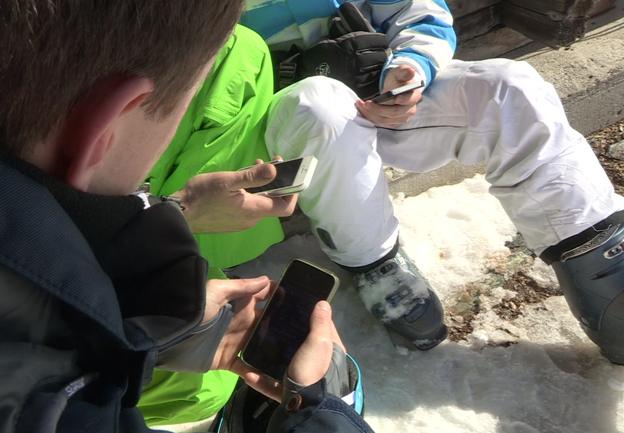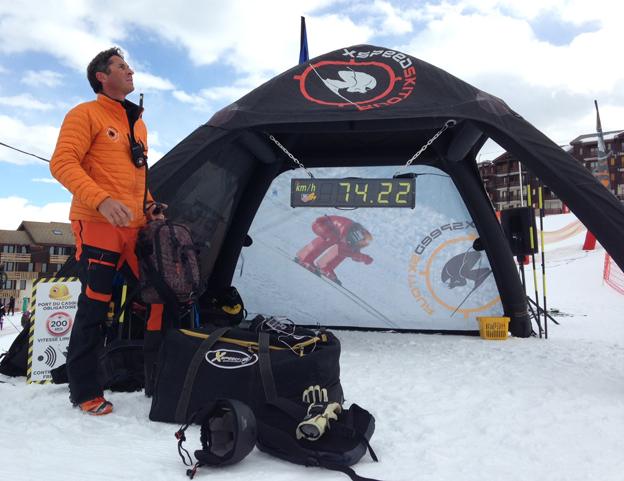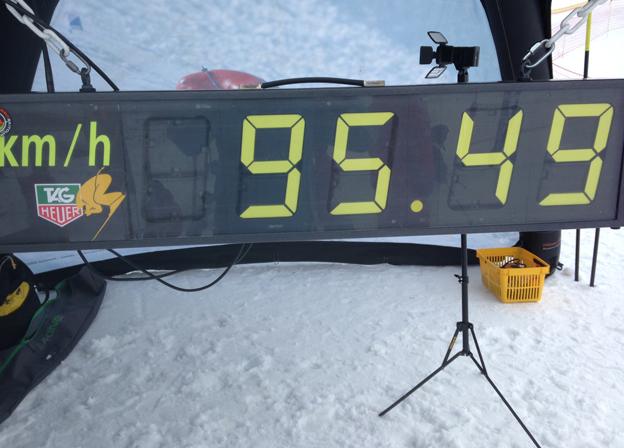Do skiing apps encourage dangerous behaviour?
- Published

Doctors in the French Alps are reporting an increase in the number of collisions and injuries involving skiers - and some are asking whether popular mobile phone apps that measure the skiers' speeds are to blame.
"I beat you!" shouts Tom triumphantly and waves his phone in his brother's face.
"Yeah, this time!" agrees Matthew reluctantly. "But don't forget that I got 96 kilometres an hour in Canada last year!"
"You're both rubbish!" jibes their dad Marcus as he skis up to join them. "I beat you both on that run!"
The family is using smart phone Ski Apps - it's a new craze which many boarders and skiers admit has given their mountain holidays a new energy and competitive edge. By hitting "start" as you set off down a run, the App which works like a car's GPS system, records where you've been on the mountain, how far you've gone - and much more to the point, how fast. The Goldsworthys, who are all competent skiers, insist they are careful to race only on deserted slopes and have never been involved in collisions while racing against their apps. But Matthew and Tom admit that in the race to win pole position on the family leader board, they do push themselves to the limits of their ability.
I ask Tom how he felt when he realised he was skiing at 96 kilometres an hour and he there's a pause before he answers honestly;
"Scared."
Speed may give a head rush to holiday makers but to the ski safety patrollers, it simply means headaches. As we sit on his Skidoo outside his first aid hut, patroller Fabrice Jolly rolls his eyes when I mention the ski app phenomenon. With his handlebar moustache and his Gallic accent diluted by an Australian twang he's picked up from his ski work Down Under, he's the epitome of laid-back cool.
"Everyone lives in the fast lane these days," he says as he watches skiers zoom past us on the piste. "People come here on holiday from the pressure of the cities and they're all addicted to technology and telephones and I watch them playing on the lifts with these apps on their phones - and when they get off…" He makes a sweeping gesture down the mountain "….They just switch off the brain." He seizes an imaginary joystick suddenly and simulates playing a computer game.
"I mean, hello? It's not Disneyland here! We're not playing a video game - this is real life with real risks. I'm sorry but ski apps may be helpful if you're lost on a mountain but on the slopes they just help you to make mistakes."
There are no statistics to suggest that ski apps cause accidents but the Medecins de Montagne, a group of French Alpine doctors has suggested it may be interested in carrying out some research. Over the last ten years they have noted a hike in the number of "heavily wounded" casualties on the pistes from 3.95% in 2001 to 5.3% last year.
There are more collisions (a third of all head injuries are now caused by skiers crashing into each other) and more accidents occurring at high speeds. Dr Alan Griffiths, a GP at Val d'Isere who's also a member of the Medecins de Montagne, has just started collecting data on the number of his patients who were using a ski app when they fell.
"I routinely ask my patients how fast they were going," he says as we sit in an outdoor cafe watching the ski schools gather on the nursery slopes. "It's important for me to know what force was involved in the injury and some of my patients can give me the exact speed they were skiing at before the impact because they were using a ski app."
We look at a feedback forum on a ski app website together and read some of the comments left by ski app users. I point to a few which are complimentary but which add that the apps had pushed them to ski harder and faster.
Emma Jane Kirby on whether skiing apps encourage dangerous behaviour.
"It's important to continue to monitor this trend," Dr Griffiths says thoughtfully. "We mustn't kill all the fun…but I think it's possible that the apps do encourage people to push out the envelope."
One of the ski app providers, Ski Tracks, sent the BBC this statement in response to concerns raised about the use of apps on the slopes:
"We work very hard to promote mountain safety through communication with our users and we have a number of safety initiatives that we are working on. We provide a great deal of enjoyment to many thousands of skiers and snowboarders around the world. We receive thousands of emails per week from all kinds of users including resort owners, patrols, parents, even schools and these have never indicated any safety issues arising from the use of Ski Tracks… The tiny minority who put themselves and others at risk would do so anyway whether they were using Ski Tracks or not."
Above the lower slopes at the nearby resort of Plagne Montalbert, the clouds have started to thicken and there's a distinct threat of snow in the biting wind. But the large group of people clustered around the speed gun by the safety netting haven't noticed the weather is changing - all their attention is fixed on the big display screen that's wired to the speed trap. Every minute or so there's a splintering sound of cracking ice as a skier hockey stops at the bottom of the run and a loud cheer goes up from the onlookers.
"84 kilometres an hour!" shouts the man in the orange ski jacket pointing to the display which has flashed up the score in lights. "Fantastic speed - congratulations!"

If anyone should know about the thrill of speed it has to be this man, Xavier Cousseau. He holds the world speed record for a descent on a mono ski - 212 kilometres an hour. These days he takes his passion on to the slopes to share with holidaymakers, cordoning off a piste, handing out helmets and encouraging tourists to bomb down as fast as they can while he clocks their times. But there's method in his madness:
"You know, people have no idea how fast they ski" he explains. "And this speed test, carried out on a secure, empty slope, makes them reflect on how fast they're skiing everyday on an ordinary, crowded slope." He breaks off to yell the score at the latest triumphant skier who's schussed down the slope.At the top of the Solaise lift in the Alpine Ski Resort of Val d'Isere, Matt Goldsworthy and his twin brother Tom are pouring over each other's smartphones as the sunshine breaks through the clouds.
"These ski apps worry me because people are just using them to race and they think it makes them good skiers. But do they know how to stop at 100 kilometres an hour? And do they know that if you hit a child at 80 kilometres an hour you will kill him - and maybe yourself?"
A teenager is punching the air and delightedly screaming his 70 km/ph speed score at anyone who will listen. Xavier pulls away from me suddenly, shakes the child by the hand in and then reminds him sternly that he must never attempt to ski so fast on an ordinary slope. His father approaches and nods towards the chronometer. "I think your scoreboard is exaggerating a bit!" he remonstrates. "I mean my boy doesn't ski that fast - I ski faster than him and I only ski around 40 kilometres [per hour], maybe 50 kilometres on a steep red like this one."
Xavier hands him a helmet and tells him to ski the run, not as if he were racing, but as if he were descending an ordinary slope. The man grins and takes the chair lift, confident that he is right and the chronometer wrong.

When the score board flashes 83km/h as he skies past the gun, the man does not crow as his son did. In fact, when he takes off his helmet, his hands are trembling.
"A child of five skies at 50km per hour," says Xavier quietly "And you should remember that cars are put through crash tests at 50km/h. And they are usually written off."
I sit in a bar in Val d'Isere with my dear friend Pat Zimmer, a former downhill champion of France - and the man who so patiently taught me to ski. Pat has reason to mistrust anything that might encourage us to ski faster - a few years ago, an out-of-control skier smashed into him and sent him flying, leaving him with a serious head injury. Now recovered, he tells me how he's anxiously watched hordes of holidaymakers stand at the top of a run, switch on their smart phone ski apps and then hurtle downwards as they try to beat their own and their friends' top scores.
"It's not just two or three of them in the race," he says "It can be six, seven, even eight of them - can you imagine the force of a group speeding down the slope?"
He sips his tomato juice thoughtfully.
"But you know, I wouldn't ban ski apps," he says suddenly. "Because maybe they can be educational. Maybe when you see on your iPhone screen that you are skiing at 100 kilometres an hour, you are going to get a big shock and the wake-up call you need to make you realise you are skiing beyond your capabilities. And maybe then you will slow down."
I hand him my phone to show him my speed scores of the day but he waves it away and repeats the maxim that has been his life's mantra.
"Forget speed. Technique is what counts."
Follow @BBCNewsMagazine, external on Twitter and on Facebook, external